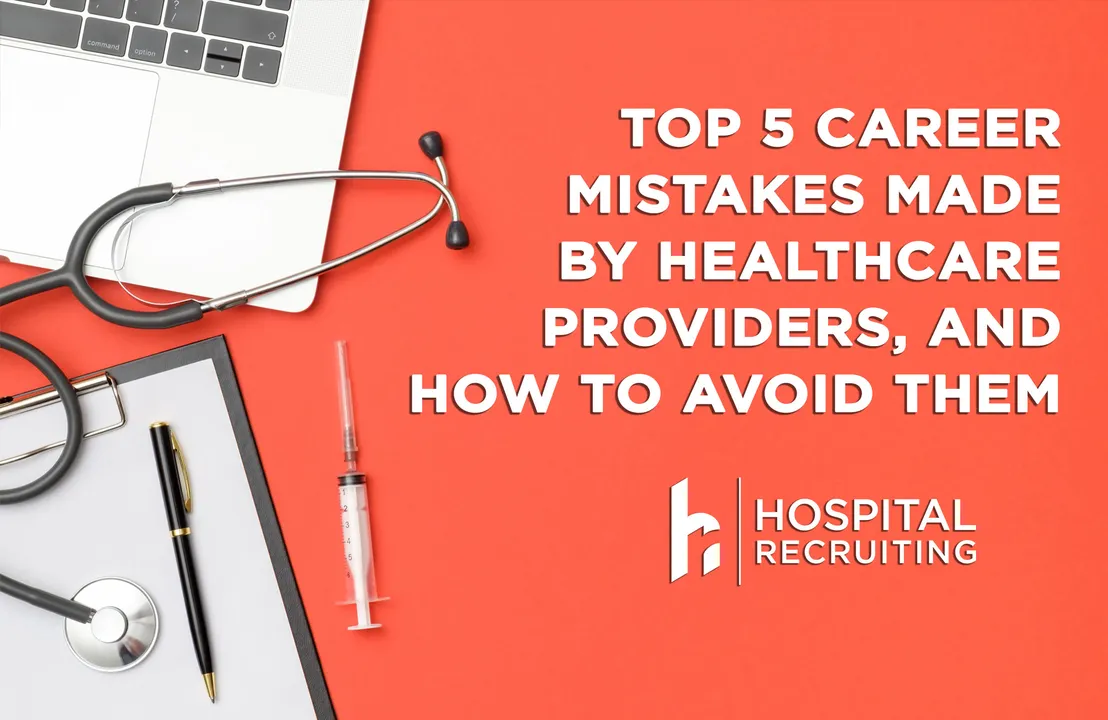Top 5 Career Mistakes Healthcare Providers Make and How to Avoid Them

Healthcare professionals are dedicated to providing the best possible care for their patients. Even the most skilled and well-intentioned professionals, however, can make career mistakes that may hinder their growth, impact their job satisfaction, or even end their medical careers.
By recognizing potential pitfalls, you can avoid career mistakes, ensuring your career and future opportunities continue to flourish. Here we cover the top five mistakes providers could make and how to avoid these common career missteps.
1. Neglecting to Stay Up-to-Date with Medical Advances

Mistake:
Some healthcare providers may fail to prioritize continuing education. Unfortunately, in healthcare, your initial training and qualifications are enough to sustain your career. Neglecting ongoing education can lead to stagnation in your professional growth and a lack of awareness of new developments in your field. This can cause you to not provide optimal care and to be viewed as a less competent provider.
Solution:
You should prioritize continuing education, taking the time to attend workshops or conferences, pursuing certifications relevant to your field, and following professional publications. Staying current with industry trends and research ensures that you can offer the best possible care to your patients while also remaining competitive in your job market.
2. Overworking and Risking Burnout

Mistake:
Healthcare is notorious for long hours, heavy responsibilities, and emotionally taxing work. Over time, this can lead to burnout, creating reduced job satisfaction and decreased quality of patient care.
Solution:
You must recognize the importance of work-life balance and self-care. It is important to regularly reflect on how you are doing and how you feel about your job. When things get difficult, or you start to feel burnt out, you should consider a change of pace or a vacation. Maintaining a healthy work-life balance can help you prevent burnout and promote your long-term career satisfaction.
3. Failing to Develop Soft Skills

Mistake:
Soft skills are a crucial aspect of healthcare but are hard to measure. Failing to attend to your soft skills, like communication, emotional intelligence, and collaboration can result in conflict with your colleagues, decreased patient satisfaction, and even medical errors.
Solution:
You should regularly invest time into honestly evaluating your soft skills and improving them, both with patients and colleagues. This may include practicing active listening, being aware of nonverbal cues, and adapting communication styles to different situations. Using soft skills effectively can lead to better patient outcomes, increased job satisfaction, and a more cohesive work environment.
4. Neglecting Networking

Mistake:
Many healthcare providers focus solely on their clinical skills and patient care, neglecting the importance of networking. This can limit your professional growth and opportunities for advancement.
Solution:
You should make a conscious effort to network with colleagues, attend conferences, and participate in professional organizations. Networking can lead to new job opportunities, connections with mentors, and knowledge about advancements in the field. By building a strong professional network, you can set yourself up for long-term success in your career.
5. Failing to Pay Attention to Professional Responsibilities

Mistake:
As healthcare providers become more comfortable in their field, attention to professional responsibilities can sometimes slip. Failure to pay attention to documentation, privacy concerns, or professional boundaries are all examples of what can result when professionals become lax in their professional responsibilities. These can all impact your career, potentially even leading to career-ending events. Burnout increases the risk of decreased attention to professional responsibilities.
Solution:
You should take time to regularly evaluate your level of professionalism in all your interactions, even if you do not have any issues in this area. Regularly reflecting on your professional performance and analyzing if there have been any changes from how you used to view professionalism can help you identify potential issues before they become habitual or more severe. By being deliberate in your professionalism, you will avoid slipping into a situation caused by inattention to your professional responsibilities.
By avoiding these common career mistakes and focusing on your networking, continuing education, work-life balance, and professionalism, you can set yourself up for a fulfilling and successful career. Remember that the path to success is an ongoing journey. By being proactive in addressing potential pitfalls and taking steps to augment your professional growth, you can continue to grow and thrive in your field.
Related Posts
